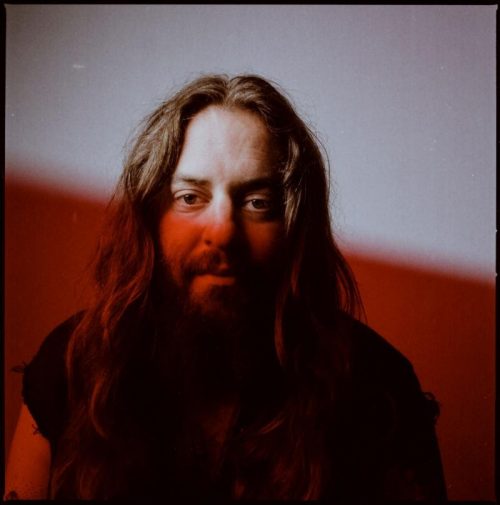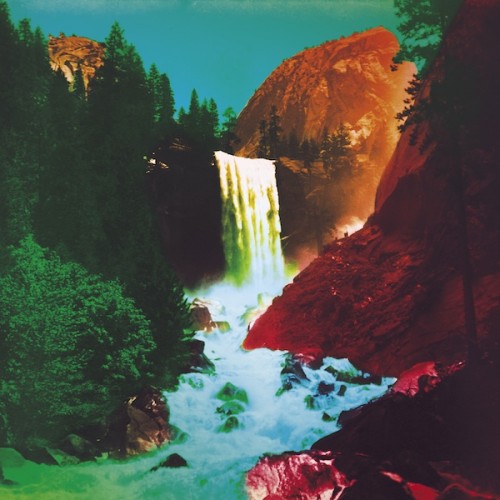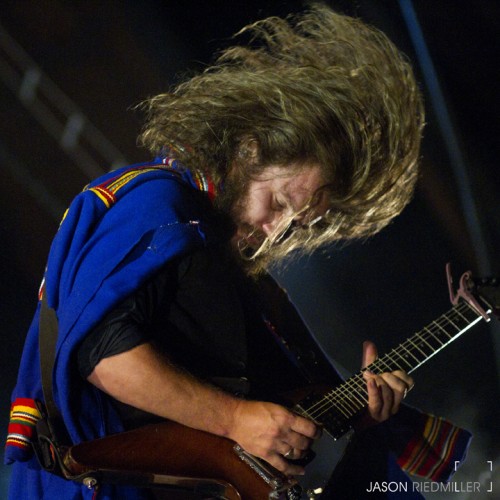After his breakthrough album “HEAL” and its 2017 follow-up, “Hard Love,” Tim Showalter, who performs as Strand of Oaks, was spent.
“I pretty much stopped,” Showalter tells Highway 81 Revisited. “And I’m always writing. It was pretty sad. The end of 2017 I was pretty worn out and I didn’t write songs, which was concerning for people in my life because that’s what I do every day.”
Showalter — who grew up in Indiana, spent his 20s in Wilkes-Barre, Pa., and has made his home in Philadelphia — had his malaise interrupted by My Morning Jacket guitarist Carl Broemel, who sent him a simple text: “Hey, if you ever want to play music, just hit me up.”
That simple act of a friend checking on a friend was the catalyst behind “Eraserland,” Strand of Oaks’ sixth album, released last month. On the record, Showalter was backed by Broemel and My Morning Jacket bandmates Bo Koster (keyboards), Patrick Hallahan (drums) and Tom Blankenship (bass). The album also features guest appearances by Jason Isbell and Amanda Shires (those two and the MMJ crew backed Showalter on a recent “Late Show with Stephen Colbert” performance).
Strand of Oaks’ “Eraserland” tour kicks off Wednesday, April 10 at the Kirby Center in Wilkes-Barre. We recently chatted with Showalter about emerging from his funk on the new album, the pressure of living up to indie-rock success and returning to his old stomping grounds in Northeastern Pennsylvania.
On “Eraserland” you sound like someone who went through some struggles but came out of it for the better. Is that the case?
I would say so. I think it’s more of maybe an earned perspective that people have when they get older. I wrote a record called “Heal” and that’s a bold statement but it’s a matter of understanding that there isn’t an end result in living. There’s not like an answer to that question but there is more of an understanding that it’s kind of a lifelong process and I think “Eraserland” gets deeper in some regards because it’s not necessarily reactionary like a lot of my records were. I do feel like there are the most hopeful things I’ve ever said on a record on this, and that makes me me feel good, especially for my personal well being, because as all songwriters, the records are an echo of who I am, and I think on the 10 songs on this record it basically is a 10-song cycle of answering the first question on the album, which is “I don’t feel it anymore” and then trying to find some resolution to that, and I believe I do at the end of “Forever Chords,” the last song.
Were these songs already in the works when Carl contacted you?
No, no, there was not a single song. There were ideas that I had but I pretty much stopped. And I’m always writing. It was pretty sad. The end of 2017 I was pretty worn out and I didn’t write songs, which was concerning for people in my life because that’s what I do every day. So the songs were created because I knew I had studio time with them. It was like a homework assignment and I think we scheduled the dates for March of 2018 in December of 2017 so that only gave me less than a three-month window to really find something, and I think that was for the best because I didn’t live in my own head. They always say your first record you have your lifetime to write it so it’s difficult to keep records going and find reasons to write so my biggest reasons to write these songs was to write them for my friends who were the best musicians I knew, and also just I can’t give them bad songs, I have to do well, and that was like a utilitarian purpose which eventually led to me writing songs so close to me because I wasn’t thinking about it anymore, and I wasn’t thinking this riff is going to serve great for the radio, and that’s important to me because I love writing songs but you almost have to trick yourself as a songwriter when you’ve done it as long as I have to like think, “This isn’t a Strand of Oaks song, this is a song for someone else,” all of these strange psychological tricks that you play on yourself.
How did you and the My Morning Jacket guys get the ball rolling?
I don’t really know the genesis of it. We’re friends and I’ve gotten to open for Jacket and we’ve played together since. Either [Carl] got a message from my manager or a friend of mine, “maybe you should give Tim a nudge to kind of get him out of this funk,” or it was serendipity and he was being Carl, because it wasn’t a loaded text, it was just, “Hey if you ever want to play music, just hit me up,” and then I wrote him back and I was very down, and I just said yeah, I don’t know what to do, I think I should make a record. And six hours later my manager called me and he was like, a little flabbergasted, and he was like, Tim, so are you making a record with the Jacket guys? And I was like, I don’t know, am I? And he was like, they booked time in Louisville, not only booked time, but Bo is the touring keyboardist in Roger Waters’ band so he had two weeks off in the middle of that tour and he took those two weeks to come to Louisville to do it with me. If anyone needs more proof that these are good people, this record is that.
In a recent interview, you said “another dangerous element of indie rock right now is that everything is pushed to get bigger so fast and become pop stars. I can’t do that.” Have you felt pressure to live up to that standard?
Yeah, I think so. It’s kind of a dangerous thing. I think it’s a result of social media and the kind of way people consume music now. Ultimately for me I’m very lucky that I have a fan base and it’s growing, and it’s a wonderful career, but I need for my own person mental health I need to view it as a career and I need to view it as, Ryan [Matteson], who manages me and is my partner in crime in all this, he told me once when I was down about something, “Tim, I care about your 15th record, I care about your 20th record. You have to look at it as the long game,” and that helped me a lot. If anything you see bands that show up and then they shine really bright and then they’re gone, and I’m still just kind of truckin’ along and I’ve had just amazing opportunities. My concept of success needs to be what I do next and if I have the possibility to keep going and a reason to keep going.
The tour starts in Wilkes-Barre. Is there any significance to that?
I reconnected maybe last year or the year before with Joe Nardone Jr. and always loved him and spent a lot of money at Gallery of Sound [record stores], so it was really cool. He brought up the idea of us doing it and I jumped at the opportunity, and luckily with our routing we are playing Philly last, so we were able to start it in Wilkes-Barre, which is awesome. It’ll be a special way to begin an already special tour and it can be this kind of full-circle journey where we start in Wilkes-Barre and end in Philly.
What impact did those years in NEPA have on you?
It’s foundational, really, because I moved to Wilkes-Barre and I was 21, so anybody who is 21, that’s that magic age where you’re not a kid anymore but you’re not a grown-up, so you have a lot of shaping to do. So I lived in Wilkes-Barre from 2003 to 2009, so that period I met my wife, I started Strand of Oaks and I was a school teacher. Those three things will forever impact my life and I’m grateful for it. That time was I guess most of my 20s. It’s foundational to who I am and who I will continue to be, so I’m pretty fortunate for that time.
What have been some of the high points for you?
There’s definitely been some highlight moments for me. Like when we did the Colbert thing I had some of my favorite musicians in the world that came out to play with me and we got to do it together, and when we were rehearsing for Colbert, we had a rehearsal space in New York, and what was great is we went through the songs about two times and then we just joked for the rest of the time and camaraderie. God, that’s just addictive.




Leave a Reply